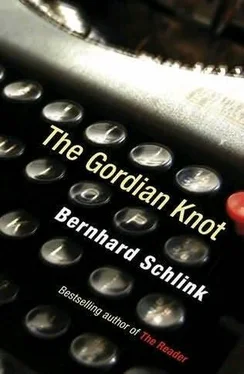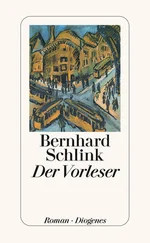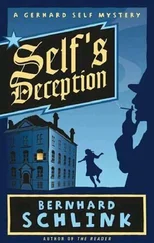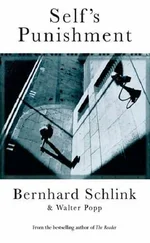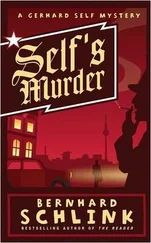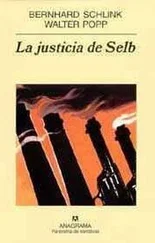The cathedral loomed gray and heavy in the morning sun. Water was bubbling out of the fountain beside it, tables were being set up on the sidewalk in front of the Hungarian Pastry Shop, and workmen were laying pipes in the middle of the street. It was a pleasantly familiar scene, and because of that familiarity Georg let down his guard. Initially, he had intended to enter the Columbia campus from the back gate on Amsterdam Avenue, though he had no reason to think they would expect him to turn up at Columbia, and hence lie in wait for him. So he decided to head for the main gate, which was closer, and he turned onto 114th Street. Not because of the three minutes he would save. It just seemed to make more sense.
They must have been standing on the corner of Broadway, keeping an eye on the subway entrance; God knows why. Perhaps they’d been waiting on the corner of 115th Street by Larry’s apartment, and had gone for a stroll to stretch their legs. Georg saw the redhead and turned around, but the redhead had seen him and began to run toward him, as did the man who was with him.
Georg ran back down 114th Street to Amsterdam. The other two were fast catching up. He turned to look, and was alarmed at how close they were getting. He wouldn’t be able to keep up this speed. If he could get to the cathedral before the others did he had a chance! If it was already open, if the others didn’t know about the little side entrance, if the side entrance was open. If not-he didn’t have the time to think about that. He sprinted across the street, cars honking their horns and braking. His heart was pounding, his legs weren’t as fast as he wanted them to be. Before the others managed to cross the street, he had reached the steps in front of the cathedral leading up to an array of doors that were always locked and one door that he hoped to God was open. He raced up the steps two at a time, his legs getting weaker. He pushed against the door. It didn’t move. He pushed harder, rattled it, the door moved, and, as he pulled, it swung open heavily. He looked back over his shoulder-the others had crossed the street and reached the bottom of the stairs. Would they try the wrong door? He ran through the nave. He kept looking back, hoping his footsteps wouldn’t give him away. The columns blocked his view of the doors, and he walked slowly. The interior of the cathedral was warm. The air was musty and heavy. It was quiet, the church was empty. From the ceiling hung a large fish made of pipes which from the tail to the head grew in length and then became shorter again, bright colors shining as the pipes trembled in the cathedral’s draft. Far behind him he heard a door slamming shut.
He had reached the side door before the others saw him. It wasn’t locked and he slipped out, closing it silently behind him. Again he ran: through the yard, the garden, across Amsterdam Avenue, along 110th Street to Broadway, and down into the subway station.
He hadn’t seen the redhead or the other man come out of the cathedral, and hadn’t seen them when he’d looked back on Broadway. Down in the subway he kept his eyes on the stairs until the train arrived, and kept looking at the platform from the subway car until the doors slid shut and the train jolted into motion.
He sat down, leaned his head against the window, and closed his eyes. He felt a pain in his chest, and his legs were heavy and tired. Those men meant business. They were out to get him. Where else might they be looking for him? In hotels? Did they have pictures of him? Was his picture now flickering on every monitor in every police station?
The train rolled from station to station. People got on and off. He would have loved to sit like this forever, fall asleep, and wake up in another time and place.
GEORG GOT OFF THE SUBWAY. The stairs leading up to the street stank of piss. Trucks roared along Houston Street, and the air they churned up made shreds of paper and newspaper pages flutter like tired birds over the dusty median strip. In the distance he could make out green fire escapes fronting red brick facades, which looked like urban hanging gardens.
On the right he looked down quiet, well-tended streets. Behind a church dedicated to Saint Anthony of Padua, whose Romanesque style reminded him of the Wilhelmine style of his high-school gym, he turned onto Thompson Street. Again, well-preserved four- and five-story buildings, on the ground floor shops selling antiques, art, or fashion. Above the buildings at the end of the street the towers of the World Trade Center seemed near enough to touch. At the next intersection Georg was on Prince Street.
Only by looking closely could he read above the entrance of the building on the corner, in faded gold lettering, 160 PRINCE. Café Borgia II was just opening for business across the street. He sat by the window and ordered an orange juice. He studied the building on the corner as if he would have to sketch it from memory one day. Red brick, high windows, decorative gables whose gray stone rose up like crowns, forming little temple friezes on the top story. Beside the entrance, there was the Vesuvio Bakery on one side and on the other a bar whose window advertised Miller beer in swooping, red-neon writing. The building had five stories. Between the second and third a band of gray stone looped around the building. There were black fire escapes, and a hydrant in front of the entrance.
The café was empty. The radio was playing oldies. On the street a Vesuvio Bakery delivery truck drove up. A mail truck came, stopped, and drove on.
Even before he could make out Françoise’s face he recognized her walk, the bouncy swing of her skirt and hips, the small quick steps of her short legs. She was pushing a shopping cart; sometimes she gave it a forward push, letting it roll, then catching up with it. She was laughing. No, it wasn’t a shopping cart, it was a stroller; out of which two tiny arms reached up.
In front of the entrance she carefully lifted up the baby. When Georg was fifteen, and for the first time unhappy in love, at school one afternoon he saw his sweetheart from a landing. She was down in the hall, leaning on the railing, cuddling a kitten from the litter of the janitor’s cat. Nevertheless, jealousy tore through him so painfully, so physically, in a way he had never experienced since. Now he saw Françoise holding the baby on her arm and wrapping it in a blanket, and for a moment jealousy convulsed his body and reminded him of the scene with the kitten.
With her foot and free hand Françoise folded the stroller and went into the building. Rage built up in Georg, a cold, bright desire to strike out, hurt, destroy. He paid and went across the street. Fran Kramer, fifth floor, apartment 5B . The outer door was open. He went up the stairs. Bicycles, strollers, tied bundles of cardboard, and garbage cans stood on the landings. The folded stroller was leaning beside the door to 5B. He rang.
“Coming!”
He heard her move a chair, come to the door, put on the security chain, and unlock the door. The child was screaming. The door opened a crack. He saw the chain and Françoise’s frightened, familiar, and forlorn face.
With a kick he broke the chain and pushed the door open. She recoiled, pressed herself against the wall, covering her breast with her hands. He was struck by the stains on her blouse and her oily hair; he had never seen her other than well-groomed and stylish.
“You?”
“Yes, me!” He stepped into the small vestibule and shut the door.
“But how… what… what are you doing here?” She looked at him horrified.
“What am I doing here in your apartment?”
“In my apartment, in the city… where have you been? How did you know?”
“That you lived here?” he asked.
Читать дальше
